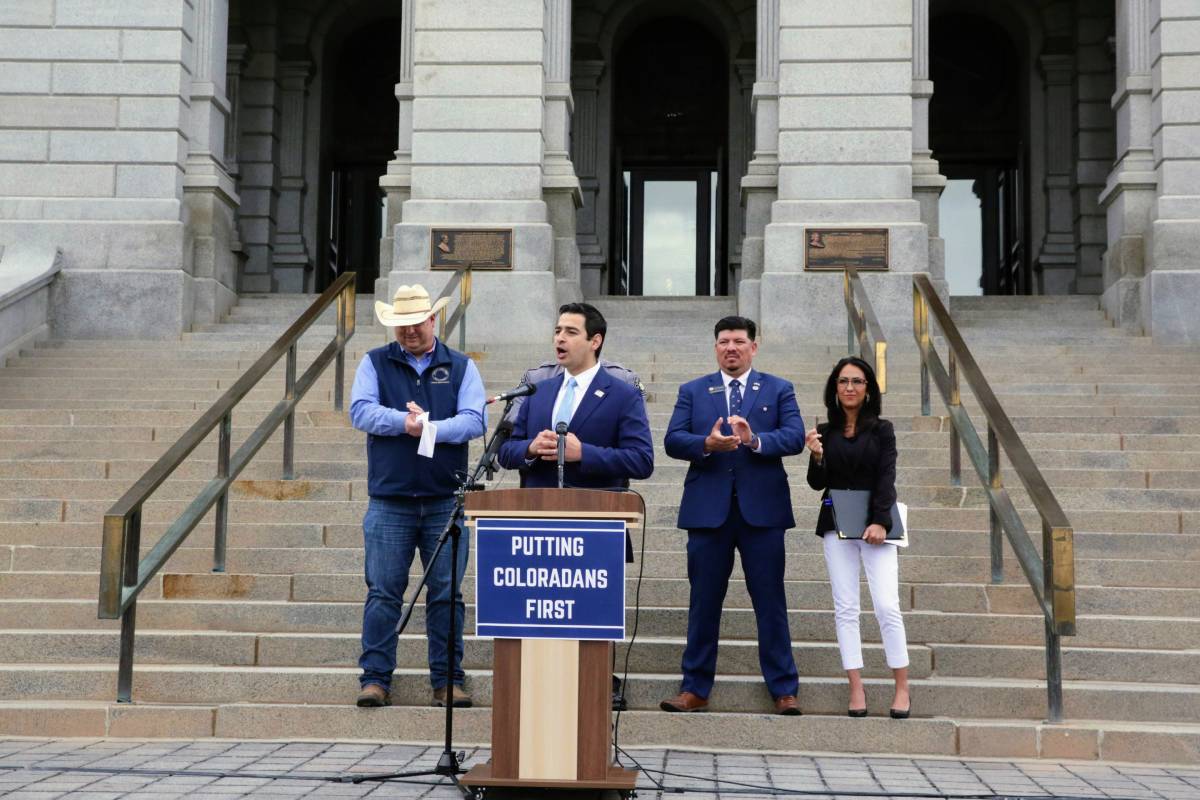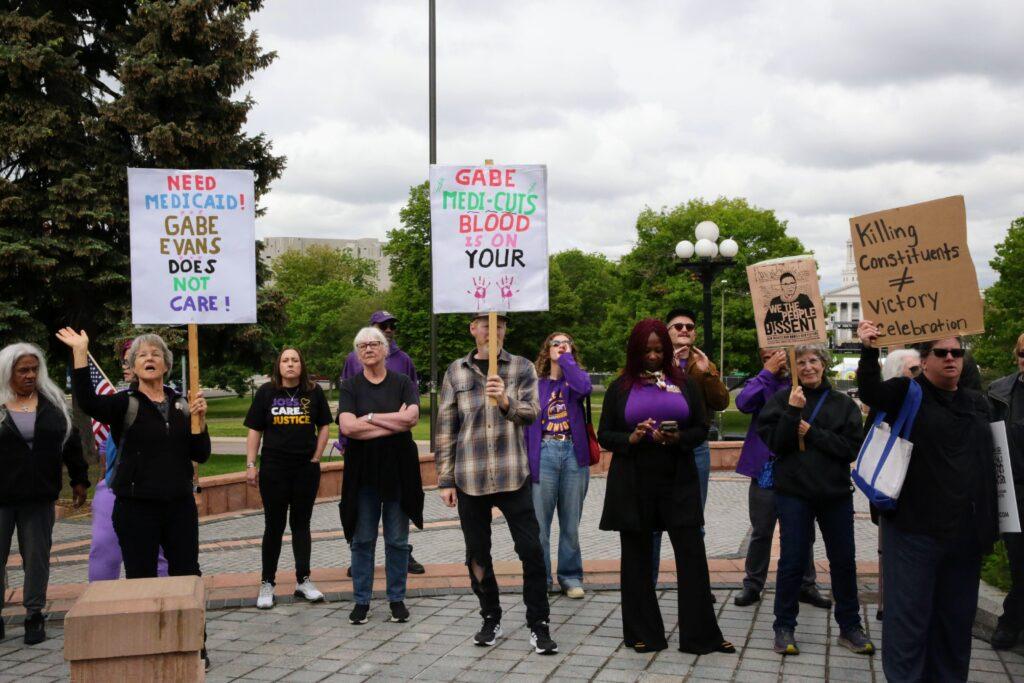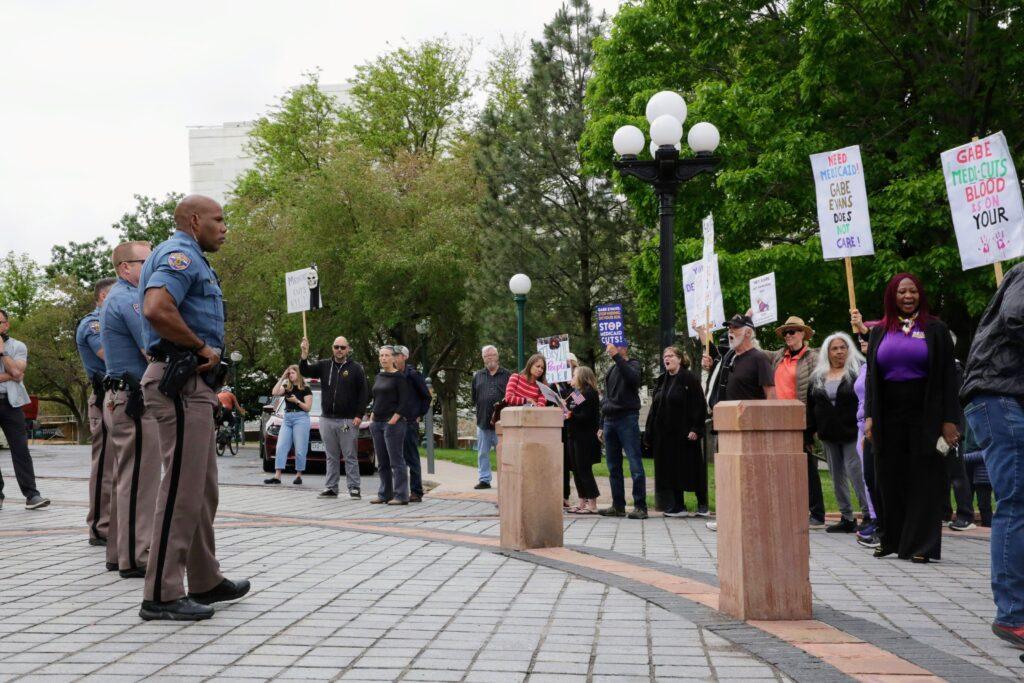
There was plenty of political theater but little political dialogue Thursday on the west steps of the state Capitol.
Rep. Gabe Evans, who represents the state’s most hotly contested Congressional district, chose that location, as opposed to one in his northern Colorado district, to deliver a full-throated defense of the Republicans’ budget reconciliation bill. The measure packs tax breaks, spending cuts, border security and more into a massive 1,000-page document.
Of all its elements, the package’s potential impact on Medicaid has become possibly the biggest lightning rod. It would represent the biggest rollback ever for federal support of healthcare, according to health policy experts. More than 200,000 Medicaid enrollees in Colorado could lose their coverage, according to one estimate. The cuts are intended to help offset the cost of the tax cuts and increased military spending.
Evans’ formal remarks lasted about 36 minutes, with another 15 minutes for questions from reporters, with the congressman doing most of the talking. He spoke in front of a dark blue sign reading “Putting Coloradans First.”
“I was a cop and a soldier for 22 years and so having sworn in my life three times to uphold and defend the Constitution and deliver that American dream to Coloradans, to people across the country, this is why we're here today,” he said. “This is why I'm proud to support the one Big Beautiful Bill.”
Protesters, focused primarily on the planned Medicaid cuts, booed through virtually the entire event. One held a sign reading “Gabe, 29% of us need Medicaid to Live,” referring to the percentage of residents in his district who rely on the program, which provides healthcare to low-income Americans.

During the comments, the crowd chanted short phrases like “shame on you” and “midterms,” an electoral threat against a Representative who won his seat by fewer than 2,500 votes.
“There's a lot of good in this bill, and unfortunately that good is being lost because of a lot of the blatant fear-mongering that is occurring around this bill,” Evans said. He said it would lower taxes for working-class families, help small businesses and strip Medicaid coverage from the group he described as “illegal immigrants” to preserve it for those who need it most.
“This is about protecting Medicaid, protecting the American dream, protecting the American dream for all Coloradans and all people in the United States,” said. “This is about standing up to the radical agenda in Washington, D.C.”
Standing with Evans were several other Republican elected officials, including Rep. Lauren Boebert from the 4th Congressional District. She said the bill was all about rooting out problems in the system.
“Waste, fraud and abuse, improper payments, that is what we are eliminating. We are not eliminating lawful use of Medicaid. This was never supposed to be something that American citizens lived on for their life,” said Boebert.
“I had Medicaid when I was a child,” she continued. “We were in this cycle of poverty and it was near impossible to get out. In fact, we had caseworkers who told my mom not to go out and find work because then she would lose her benefits and something may happen to her children. And so this was a cycle of poverty that we were stuck in.”
Boebert said she was grateful as “to have broke free of that because there was so much pride in actually going to work and earning an income and even being able to offer a hand up to those around you, rather than tell them where to go to get a handout from. The system is there for those who need it.”

ProgressNow Colorado, which helped turn out protesters for the event, lambasted Evans’ remarks, accusing him of merely reciting talking points, without answering concerns from residents.
“In a district that is the most closely politically divided district in the state, if not the entire nation, Gabe Evans's decision to lash himself to the Trump brand is politically inexplicable. I don't know why he's doing it,” said Alan Franklin, the group’s deputy director. He said he lives in Thornton, in Evans’ district.
“I don't know who's giving this advice, but I do believe it is career-ending advice. Whoever's telling him that the MAGA brand is the only way forward for him wants to end his career,” Franklin said.
The crowd, which State Patrol had to ask to back off a bit at the start of the event, included a number of Evans’ constituents, unhappy with his support for the bill.
“We are protesting against the bill that cuts Medicaid and food assistance, takes food out of hungry kids' mouths,” said Ernistine Garcia, who lives in Evans district. “Not only that, they want to take it and give a massive tax break to the billionaires, the upper one percent. And so it's like killing us so that they could have more.”

In his remarks, Evans said it’s his critics who are out of touch. Evans served as an Arvada police officer, before getting into politics and noted he wore his boots from those days to the event. “I wear my police boots every day in the halls of Congress to remind me why I'm there, who I'm fighting for, and to never lose touch with the people that I served every day for over 10 years on the streets here in the Denver metro area,” he said.
In spite of the vocal opposition, participants in Thursday’s press event rated it a success.
“I thought it was great to get to be transparent about what the bill actually does, and I love tax cuts,” said another speaker, state Sen. Byron Pelton, a Republican from Sterling, who represents a district in northeast Colorado, after the event.
He noted he believed some of the protesters included union organizers. “I still don't think that they're representing their membership if they're going to seriously boo ‘no tax on tips’ and ‘no tax on overtime,’” Pelton said. Those are two provisions in the bill.
He credited Evans with bringing his message directly to the state Capitol, which is controlled by Democrats. “I think that the fact that we have to ask the federal government for help to help rescue Coloradans, to be able to lower the cost of living here is a huge misstep by what the Colorado legislators legislation has done in the past. And I think Congressman Evans, bringing it back to Denver, is a perfect example of his leadership and what it means.”
A bit of Q and A
When it came to questions from the gathered press, Evans walked out to get within earshot of reporters and be heard above the booing protesters.
The first question came from a reporter seated on the ground, typing on a laptop, was “why do this, and subject yourself to this?” referring to the outspoken crowd.
“We are being open and honest about what is in the bill,” Evans said. “You don't have to agree with what I say, you don't have to like what I say, but nevertheless, we are here to lay out the facts, to give the truth, to talk about what this bill does.”
Another reporter asked about the Trump administration’s hardline approach on immigration and the impact focusing on “violent criminal organizations” has on immigrants who are in the country legally.

Evans said he’s spoken with Immigration and Customs Enforcement officials about their day-to-day work. “What they told me is what we've said all along: they are targeting the violent, illegal criminals in our community. They are targeting the folks who have court-issued orders for removal. Those are the folks that are being targeted. They're going after the gangsters, not the grandmas.”
On Thursday, CPR News reported on a Colorado family, including a child, detained by federal authorities when they came for a routine check-in at Denver’s immigration court.
Evans shot back at a question about whether he’s avoided in-person town halls, afraid of constituents angry about his positions and votes. “We've done two town halls, we've reached over 11,000 people via those town halls,” he said, adding he’s held around 80 in-person events with businesses, health providers, grocery stores and others.
Evans hosted a telephone town hall last month, after weeks of pressure from some voters in his district and groups aligned with Democrats.
How many people in his district will be kicked off Medicaid by the Reconciliation bill? Another journalist asked. Evans insisted there would be no cuts to “lawful beneficiaries” of Medicaid.
Only three groups are at risk, he said.
“It's people that are ineligible, it's illegal immigrants and it's able-bodied working-aged adults with no dependents who choose not to work, volunteer, or go to school part-time. But that is their choice,” Evans said, referring to a part of the bill dealing with work requirements for Medicaid recipients. “They 100 percent are in the driver's seat. They have control over whether or not they continue to remain eligible for Medicaid by complying with these community engagement requirements.”
Starting at the end of next year, adults without children who also don’t have disabilities would be required to work 80 hours per month to qualify for benefits. The bill also penalizes states, like Colorado, that are using their own money to cover health care for undocumented immigrants. Under it, Colorado could lose Medicaid funding if it doesn’t end its program to cover undocumented children, pregnant women and new mothers.
Some critics of the bill have described it as Robin Hood in reverse, taking from the poor and giving to the rich, in the form of tax cuts for the highest income brackets. Evans batted back a question about that characterization.
“Patently false,” said Evans. “It is everyday working-class Americans who are benefiting under this. They're the ones getting tax breaks. The billionaires, guess what? Their tax rate isn't changing. It's exactly where it is a couple of years ago. But the tax rates and the tax breaks for working-class Americans are going down.”
If the bill becomes law, it will make permanent the income tax rates from the 2017 Trump tax law, meaning tax rates will stay as they currently are for all income levels. However, it also includes an added inflation adjustment for all but the highest tax brackets that could result in lower tax bills.
Evans cited reporting from the New York Times, though in its coverage, it has cited watchdog groups that calculate the bill may offer only modest gains to ordinary workers and that cuts to safety net programs could outstrip the tax benefits, with some people being left in a worse situation.
Democrats offer swift rebuttal
Democratic legislative leaders and members of the state’s Joint Budget Committee, as well as health care providers, held a virtual press event after the Republican press conference.
They repeated their message that the bill will kick people off Medicaid and be harmful to everyday, hardworking Coloradans.
The state’s estimate is that between 140,000 to 230,000 people in the state would lose healthcare coverage due to the bill’s changes, equaling about 11 to 18 percent of its current Medicaid participants, according to House Speaker Julie McCluskie, a Democrat who serves a district on the Western Slope.
“It depends on where the budget lands, of course, but those are our initial projections,” she said.
Colorado could also lose hundreds of millions of dollars in food assistance funding for the program known as SNAP. The bill requires states to pick up more of the tab for food aid, but lawmakers said the state doesn’t have the capacity to replace the lost funding.
“I look to this as being something potentially catastrophic for many families and something that the state will have significant challenges backfilling,” said Rep. Shannon Bird, a Westminster Democrat, who recently announced she’s challenging Evans for his seat.
| This story is part of a collection tracking the impacts of President Donald Trump’s second administration on the lives of everyday Coloradans. Since taking office, Trump has overhauled nearly every aspect of the federal government; journalists from CPR News, KRCC and Denverite are staying on top of what that means for you. Read more here. |








